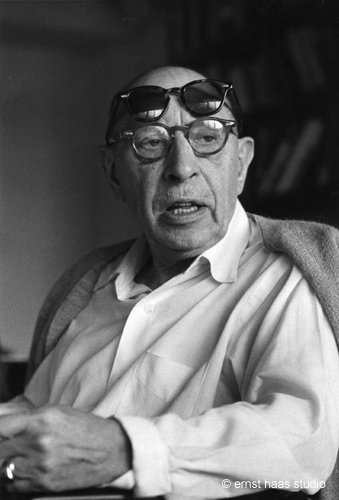Léonie Sonning music Prize 1959
The Russian composer Igor Stravinsky received the Léonie Sonning Music Prize of 50,000 Danish kroner at a concert during the Danish Music and Ballet Festival on 25 May 1959 at the Tivoli Concert Hall in Copenhagen. The concert was attended by King Frederik IX and Queen Ingrid.
The programme
Carl Nielsen Masquerade Overture
Vagn Holmboe Symphony no. 7
Igor Stravinsky Wind octet (1923)
Igor Stravinsky Firebird suite
The Royal Danish Orchestra
Conductors: John Frandsen (Nielsen, Holmboe)
Igor Stravinsky (Firebird suite)
citation
The prize was presented by the Director of the Royal Danish Academy of Music, Knudåge Riisager, who included the following words in his speech:
‘With the establishment of the Sonning Music Prize, Denmark has the opportunity to honour prominent personalities in the world of music. This is the first time that the Sonning Music Prize has been awarded, and in fact the first time at all that an artistic prize of such considerable size has been awarded in this country. It seems quite natural that you, Mr Igor Stravinsky, have been chosen as the first recipient of this award, which is an expression of Danish music life’s recognition and respect for the man who personifies the peak of the music world. For just as Albert Einstein, with his interpretation of the universe that surround us, was able to change our image of the world so that it will never be the same again, so have you, Mr Stravinsky, through your life’s work, been able to change the music of your own time.’
The Léonie Sonning Music Prize of 50,000 Danish kroner is hereby awarded to the composer Igor Stravinsky in recognition of, and deep admiration for, his epoch-making efforts as a creative musician. His works have enriched our generation and will in future remain a shining expression of universal musical art.’
You can listen to the speech from the ceremony here:
Stravinsky and Denmark
Stravinsky performed for the first time in Denmark in 1924, when he played his new Piano Concerto on 17 July at the Tivoli Concert Hall, conducted by Frederik Schnedler-Petersen. ‘It was the first time the Piano Concerto was heard here in Denmark, and it was not easily understood at the first interrogation. The piano part must be difficult to perform, but the composer proved to be a master in that respect,’ wrote the daily newspaper Folkets Avis. ‘The audience was beside itself in excitement, the artist was given handshakes, flowers and an infinity of curtain calls,’ the Copenhagen newspaper added. Stravinsky returned twice to perform his own music. In September 1925 he conducted his ballet Petrushka at the Royal Danish Theatre, and in 1934 he was the soloist in his own Capriccio for Piano and Orchestra at a concert with the Danish National Symphony Orchestra conducted by Nicolai Malko.
Before the prize concert in Copenhagen, Stravinsky and his wife Vera arrived at Kastrup Airport on 22 May and stayed at the Hotel d’Angleterre. On 23 May, Stravinsky attended a performance of his ballet Apollon Musagète at the Royal Theatre. The next day, the Danish government held a gala dinner with the Prime Minister HC Hansen as host. In the evening after the prize concert on 25 May, there was a reception at Copenhagen City Hall.
The daily press wrote, among other things:
Paying heed to both enthusiasm and restraint, one still had to admit that the evening was one of the big ones – one of the biggest one has experienced. One of those one will never forget. Not just because the Royal Danish Orchestra added another page to its extensive history, or because an exclusive audience led by the Royal couple gathered for a party night celebrating contemporary music, but also because, if one is receptive to the charisma which a great personality rightly or wrongly will always exert, one was moved to encounter this little man with a pale face and wise eyes behind thick glasses. One was moved to learn how to bow in admiration for the extent of another person’s power and consequence, even in his own time.
(Information May 26, 1959)
It is the rhythmic Stravinsky who conducts; lyricism belonged to his youth. The beats are fast, elastic – a long life of struggle to get musicians to play short, sharp quavers. The piece reaches its climax, ends abruptly, and the Danish music lovers and Danish public join hands to pay tribute to the little man of music. He gets handshakes, heaps of bouquets, and a big evening rings out with the last crashing applause.
(Politiken, May 26, 1959)
The 77-year-old master has lost nothing of his youthful intensity, and the Royal Danish Orchestra sparkled. How many times Stravinsky had to come forward to accept thanks after this could not be counted. A sea of mighty bouquets of flowers almost buried the little man, who with speed and resilience hurried from the podium to the stage exit and back again. Only when the Royal couple, leading the tributes, left their box did the cheers slowly die down. It was one of the great evenings.
(Sigurd Berg, Dagens Nyheder, 26 May 1959)





